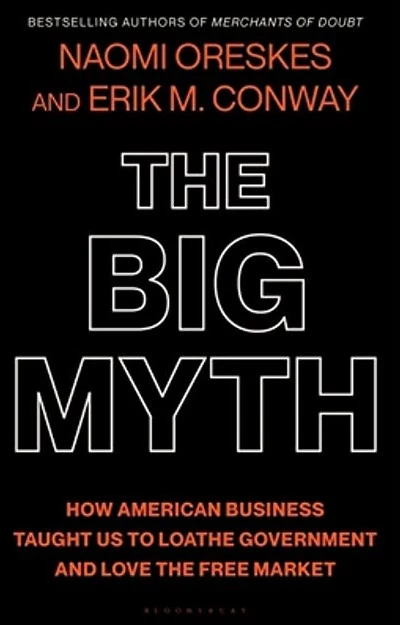
According to the American Economic Association:
Economics can be defined in a few different ways. It’s the study of scarcity, the study of how people use resources and respond to incentives, or the study of decision-making. It often involves topics like wealth and finance, but it’s not all about money. Economics is a broad discipline that helps us understand historical trends, interpret today’s headlines, and make predictions about the coming years.
If that’s how professional economists define their field, a question should arise in your mind: what does economics have to do with human freedom? To understand human freedom, other fields of study seem to be more relevant: philosophy, sociology, political science, or even history. In their new book, Naomi Oreskes and Erik M. Conway, The Big Myth: How American Business Taught Us to Loathe Government and Love the Free Market (read an excerpt here), tell us why Americans tend to think that “freedom” is best addressed by economics. As the title indicates, it is the result of over a century of mythmaking funded by businesses, corporations, and very, very wealthy people. It is the Big Myth.*
The book is a critique of the extensive public relations campaign that “market fundamentalists” have been conducting in the United States for over a century. Oreskes and Conway have nothing against markets and give credit to them where credit is due. The difference between them and the “market fundamentalists” they critique is that:
Contemporary conservatives, libertarians, and market fundamentalists are not really defending capitalism, even if they think they are. They are defending a certain idea of capitalism, a vision of growth and innovation by unfettered markets where government just gets out of the way. (p. 13)
The idea of the perfect, unfettered market, however, existed, “precisely never. There has never been a time in human history when markets met these conditions, and there is no reason to think that such conditions could ever exist” (p. 418). Nonetheless, the utopian vision of a “free market” has been invoked time and time again against any kind of governmental oversight or regulation of businesses.
Market fundamentalists can only advocate for unfettered markets by ignoring the role government has always played in capitalism. For example, free market fundamentalists make much of what they call the “Great Enrichment:” the great growth in wealth beginning in the 19th century. I’ve pointed out in this space before how slavery, not libertarian “freedom” was responsible for a great deal of that wealth (see here and here). Oreskes and Conway point out that much of the geographic expansion that fed the “Great Enrichment” came from the displacement of American Indians (pp. 172-85, 226). The idea that European settlers could simply take the land of indigenous Americans comes from John Locke’s idea of “property rights” and has been endorsed recently by conservative pundit, Jonah Goldberg. No market fundamentalist idea is every truly dead.
Oreskes and Conway also document the rise of industrial technology, the “American System of Manufactures” which allowed interchangeable parts in machinery through the development of machine tools. This technological revolution allowed for the mass production of goods on a scale never before possible. The revolution in industry resulted from the federal government’s investment in the problem: “It took nearly fifty years–what would have been an inconceivable period of research and development for a private corporation in the nineteenth century (or today for that matter)–but once it was achieved, it revolutionized manufacturing” (p. 124). When confronted with well-documented histories of governmental involvement with the creation of wealth and advancing capitalism, market fundamentalists like Milton Friedman, just ignore it, or worse, lie about it (p. 275). The market fundamentalists create a fictional past to suit their ideological predispositions and, more importantly, the ideological demands of those paying them.
*Full disclosure: Erik Conway and I are graduates from the same PhD program and had the same advisor. He’s a friend. Oreskes and Conway flattered me with a brief mention in the acknowledgments for a tiny bit of help finding some hard-to-locate publications. I have admired and taught their previous book, Merchants of Doubt: How a Handful of Scientists Obscured the Truth on Issues from Tobacco Smoke to Global Warming as well as the related documentary. Additionally, I have used Oreskes’s book, Why Trust Science? as a text in my “Science and Public Policy” class since its release a few years ago.
